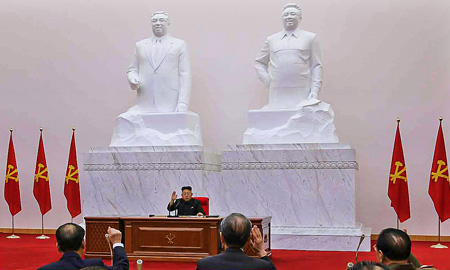- California Assembly OKs highest minimum wage in nation
- S. Korea unveils first graphic cigarette warnings
- US joins with South Korea, Japan in bid to deter North Korea
- LPGA golfer Chun In-gee finally back in action
- S. Korea won’t be top seed in final World Cup qualification round
- US men’s soccer misses 2nd straight Olympics
- US back on track in qualifying with 4-0 win over Guatemala
- High-intensity workout injuries spawn cottage industry
- CDC expands range of Zika mosquitoes into parts of Northeast
- Who knew? ‘The Walking Dead’ is helping families connect
Kim Jong-un calls meeting on abuses in N. Korea ruling party
TOKYO (AP) — North Korean leader Kim Jong Un presided over a meeting of senior ruling party officials aimed at rooting out corruption and abuses of power ahead of a major congress to be held in May, its state media reported Thursday, calling the gathering the first of its kind.
The meeting this week focused on strengthening the ruling party and criticized “the practices of seeking privileges, misuse of authority, abuse of power and bureaucratism,” according to a report by the Korean Central News Agency.
It is unusual for North Korea’s state-controlled media to make note of such problems within the ruling Workers’ Party of Korea, which Kim heads and which has been in power since the founding of North Korea in 1948.
In its annual report released last month, North Korea and Somalia were listed at the top of Transparency International’s Corruption Perceptions Index for the second-straight year as the most corrupt governments in the world, scoring only 8 points on a scale of 100.
The meeting was held as world attention is focused on North Korea’s Jan. 6 nuclear test, which it claims was the first of a hydrogen bomb, and its announcement it will launch a rocket this month to put its second Earth observation satellite in orbit. The U.N. Security Council is now discussing whether to slap new sanctions on the North over the nuclear test, which violated U.N. resolutions already in place.
North Korea’s ruling regime, meanwhile, is heavily focused on preparing for the 7th Party Congress, a major event that will be closely watched for signs of new policies or priorities that could provide insights into how Kim — who assumed power after the death of his father, Kim Jong Il, in late 2011 — intends to deal with his country’s economy, domestic political issues and external relations.
The KCNA article said the congress, the first since more than 3,000 delegates gathered for the 6th Congress in 1980, will “be recorded as a new landmark in the history of the party.”
It said Kim told this week’s gathering that the party is faced with “manifold difficulties and ordeals,” but added that he said “nobody in the world can block our way.”
The marketization of the North Korean economy has been steadily growing since the famine years of the 1990s, when the breakdown of the state-run Public Distribution System that provided most North Koreans with food and basic necessities for free or at highly subsidized prices is believed to have forced many citizens to produce and sell goods on their own to make ends meet.
As such economic activity, often conducted in cash, grew on the fringes and has become more mainstream, it created opportunities for some individuals to amass wealth and has led to what many see as a nascent middle class that is growing in the North and particularly in places like the capital, Pyongyang.
But it is believed to have also opened up more avenues for officials in the party and the powerful military to seek bribes to look the other way or to demand kickbacks.
















